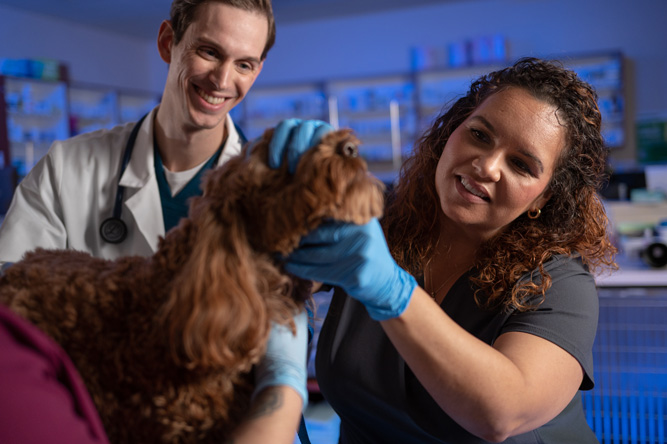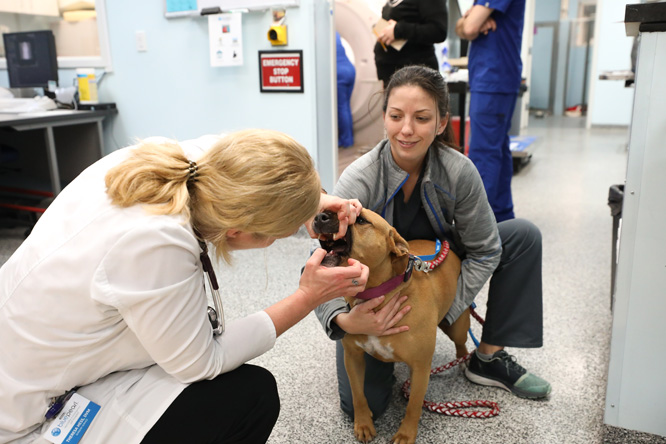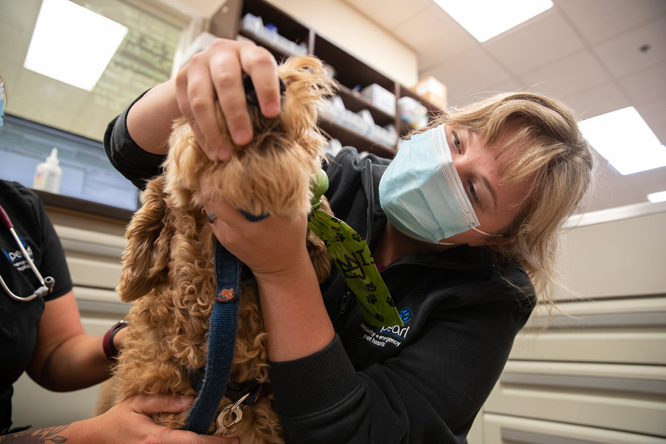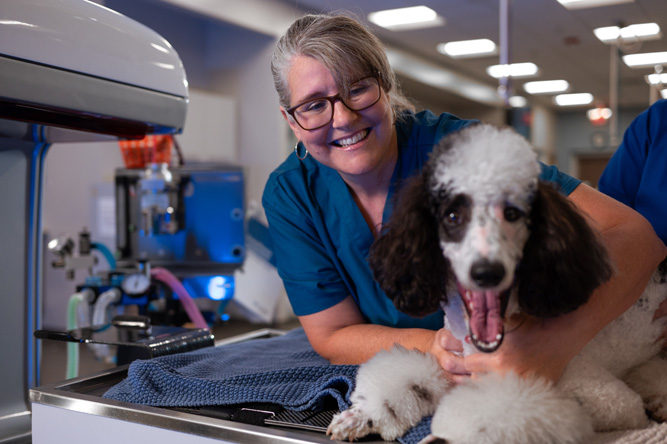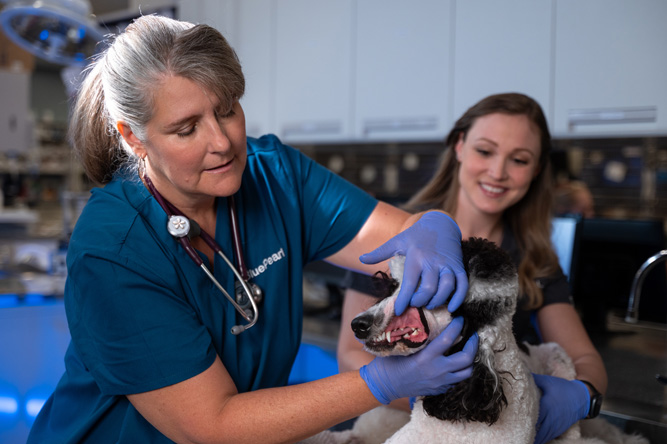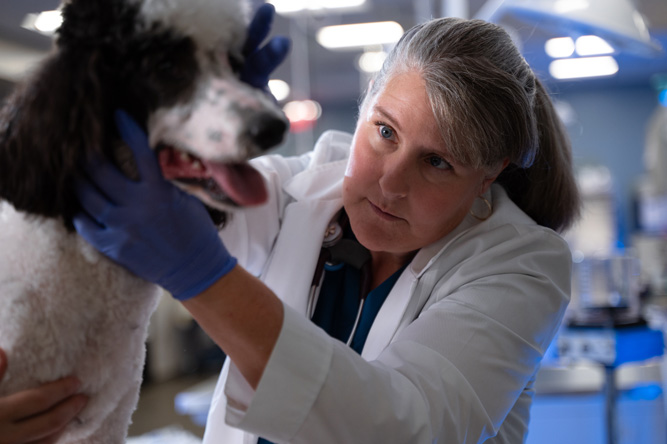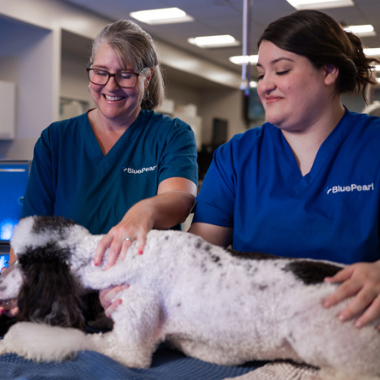Pet dentistry and oral surgery by BluePearl.
Treating the root of the matter – to help your pet live a longer and better life.
We understand that seeing your pet experience unusual symptoms or act out of the ordinary can be stressful – especially if you don’t know what’s wrong. Fortunately, our veterinary dentistry and oral surgery team is made up of experts in diagnosing and treating diseases of the teeth, gums and mouth, and we’re here to help.
Our commitment is not just to treat illnesses; it’s to enhance the well-being of your pet and be with you every step of the way.
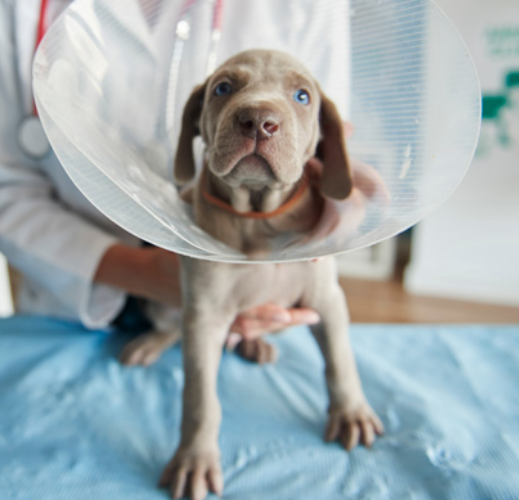
Conditions we treat.
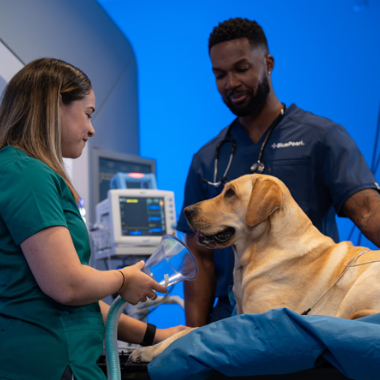
If your pet has a dental condition, you’ll have an entire dentistry and oral surgery team helping to improve your pet’s quality of life so you can get back to what matters most – spending precious moments together.
- Broken teeth
- Fractured jaw
- Gum disease
- Bite misalignment
- Mouth tumors
- Mouth pain
- Inflammation in mouth
- Tooth resorption (loss of tooth structure from within)
- Cavities
Services we offer.
Your pet will receive unparalleled medical care during their time at the hospital (and they’ll be spoiled with love and attention, too).
Advanced diagnostics
Your pet can’t tell us what’s wrong, so we use sophisticated diagnostics and imaging tools to uncover the source of the problem.
- Radiography (x-rays)
- Blood testing
Treatment plans
Just as no two patients are the same, neither are their treatment plans. Our dentistry and oral surgery team has experience with a range of advanced procedures and minimally invasive care options to get your pet on the path to wellness, including:
- Oral surgery
- Root canal therapy
- Maxillofacial surgery
- Extractions
- Periodontal disease treatment
Our board certified specialists and surgery team.
Experience makes all the difference.
Our dentistry and oral surgery team is made up of veterinarians, vet technicians and assistants, and support staff with rigorous training and experience in specialty medicine. The team works hand in hand to provide the comprehensive, compassionate care your pet needs and deserves. Because we’re a multidisciplinary hospital, the team can consult the expertise of other specialty departments, too.
Curtis Stiles
DVM, DAVDCDr. Curtis Stiles has been practicing veterinary dentistry for over 15 years. He was the first recipient of the Presidential Medal for Stewardship from the American Veterinary Dental College. He finds oral surgery cases particularly gratifying.
- Diplomate, American Veterinary Dental College
- Residency, Dentistry & Oral Surgery, University of Pennsylvania, Philadelphia
- Internship, Small Medicine & Surgery, Atlantic Veterinary College, Charlottetown, Canada
- Doctor of Veterinary Medicine, University of Guleph, Ontario, Canada
Dr. Stiles lives with his wife, three children, two rescue dogs, fancy cat and one fuzzy buzzy. In his spare time, he enjoys gardening, hiking and camping.
What to expect.
We want you to be prepared for your pet’s visit to the dentist, so you have one less thing to worry about. Our entire BluePearl team will be with you every step of the way.
Before your visit
- Make an initial appointment by calling us directly or via referral from your pet’s primary vet.
- We’ll get records from your primary or emergency vet before your first visit and collaborate with them to discuss your pet’s history and current condition.
During your visit
- When possible, we’ll examine your pet with you by their side to make them more comfortable. If additional tests are needed for a diagnosis, we’ll discuss those options with you.
- You’ll have plenty of time and opportunity to ask questions as we go over your pet’s diagnosis together.
- Before you leave, you’ll receive a detailed treatment plan, discharge instructions and any recommended medications. We’ll schedule a recheck appointment and make sure you’re aware of any symptoms you should watch out for at home.
After your visit
- Our team will continue to partner with your primary veterinarian as part of the ongoing management of your pet’s care.
- You know your pet better than anyone, and you play a crucial role in their treatment plan. If you have any concerns about providing care at home (such as giving medication, maintaining a specific diet or monitoring your pet’s symptoms), let us know – we’re here for you.
